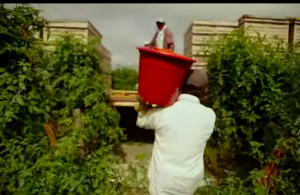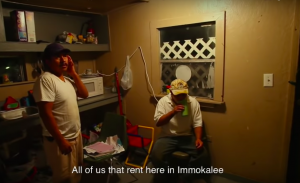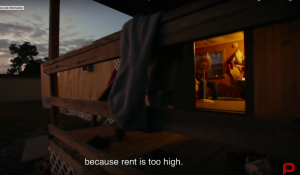Food Chains is the plight of the tomato farmer. “How they suffer so we can pay less. ”
It is focused around “Immokalee farmers in Florida, a group of tomato pickers conducting a hunger strike against the popular Publix supermarket chain. The coalition’s request is simple but ingenious: that giant retailers pay just a penny more a pound for tomatoes and refuse to do business with growers who exploit workers with low wages and terrible working conditions. That extra penny would go a long way toward bringing migrant workers out of poverty.” It would double their salary, and it seems like an easy change to make. Yet retailers, who are more focused on maintaining their billions don’t agree.
Key Aims and Messages
Overarching themes: Morality, complicity of large buyers, human cost, food supply, farm slavery, farmer wages, working conditions.
The primary aim of this documentary was to put focus on the work environment that Florida farm works are working in and how much they are getting paid for the work they are putting in. Some of the key messages talked about in this film were how the farms were being run and how work environments for these farm workers weren’t safe and some were being sexually harassed and even enslaved within the borders of the US. Another key message in the film was how much the workers were being payed. Some of these workers were getting payed less than minimum wage and others just minimum wage and couldn’t provide enough money for their families or even themselves to survive and live comfortably.


“fair food program, which partners with growers and retailers to improve working conditions for farm laborers in the United States.”
Ideologies
This film puts a focus on how bigger corporations and food chains have an influence on the lives of farm workers in the US. The film start off by taking a look at some of the farmers in Florida and the lives they are currently living. they show images of low income neighborhoods and poor living conditions. They focus a lot of on the money aspect the entire film and how if one of the largest supper markets Publix raised tomato prices a penny more than that could greatly influence the lives of all the farmers.
 .
. 
“Inside the trailer, there can be up to 15, 16 people because the rent is so high”
They also go off on side stores and key issues in the daily lives of farmers. One main issue is the safety of their work environment. They bring up a huge issues of sexual harassment especially among women farmers and how some of these women can’t do anything about it because they will loose their jobs if they do. They also talk about threats and slavery run illegally within some of these farm places.

“Terrible poverty and exploitation was hidden from view… we used to own our slaves, now we just rent them.”
Talking about other major issues like this helps them make the point that if better rules were in place and bigger corporations like Publix charged more for tomatoes that all of these issues from sexual harassment to living in poverty could be solved and these farmers could live better lives.
Key Storylines
The key storyline was that Publix was refusing to even talk to the farmers about raising prices of tomatoes and participating in the Fair Foods program. The point that the farmers were trying to make was that farmers were living hard lives and that if bigger corporations helped by raising prices a little and by participating in the Fair Foods program that farmers could live more healthy, sustainable, and safer lives.


Overall the film presents the unfair conditions faced by the workers and the coalition started in order to end these conditions. Farmers living in over populated houses, who somehow are able to pick some 4,000 pounds of tomatoes a day. Making their situation more difficult is the fact that most of them are undocumented, and that many of the female workers face pervasive sexual harassment, with a slavery ring being uncovered in 2007.
Linkages to Class
This document could be linked back to class in a couple different ways. One way is relating this to our foodways. Foodways is the “patterns that establish what we eat, as well as how and why
and under what circumstances we eat” (Edge, 2007). If the tomato farmers decided that they were going to stop selling tomatoes to big corporations like publix then the consumers wouldn’t have access to tomatoes. this foldaway system has an effect on the food we get and how we get them and if the farmers change their process then the rest of the system is thrown off.
Opinion
I thought this film was really good and I would recommend it to people who want to have a different view on the way we get our food. I wish the movie would have talked about the middle men in the system and how they have an effect on the farmers as well and not just the larger corporations like Publix. This documentary changed my view on farmers and the entire food system. I never realized that farm workers were treated so horribly and lived in such bad conditions. I think I will now be more aware of where my food is coming from and will try to buy tomatoes that are apart of the Fair Food Program. I think the documentary did a good job of getting its point across and did get the message out there that this area of work does need help. I am a huge Publix lover so watching the documentary was hard but I will still forever shop at publix I just might start buying my tomatoes somewhere else.
This film did a great job at telling the story of activism and rights from an individual and community based point of view. It remained focused on the long term and short term consequences of the system farmers lived in. The ideologies of going without food today so their children don’t have to tomorrow was never lost throughout the film and was such a moving motto. I appreciated the way they addressed slavery still existing and the many forms it takes. Seeing individuals fighting for justice and not faking how rough and long it is was refreshing. Activism is difficult and costs a-lot economically, physically, and mentally and all of that was shown throughout the movie. Yet, still their moral was never lost. It also shows the police system and how upside down it is. These people had permits, and stayed were they were told and still the police were there making sure they didn’t do anything wrong and asking them to leave.
I know many people who work at publix and have forwarded this movie to them. I myself do not shop at publix as it is expensive and Walmart is much more my style though Walmart has their issues too. I think publix needs to re-evaluate the brand of hospitality they advertise to their customers when they can’t even extend the same hospitality to their suppliers.
References
About the Film. (n.d.). Retrieved from http://www.foodchainsfilm.com/